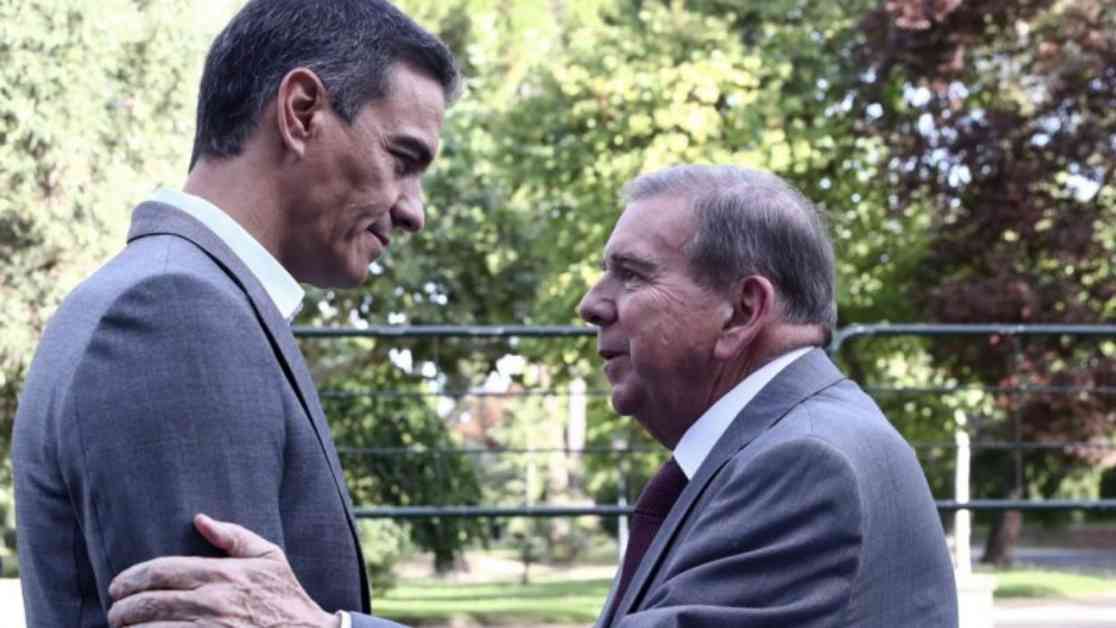Spanish Prime Minister Pedro Sánchez has expressed his unwavering support for Venezuelan opposition leader Edmundo González Urrutia, who has sought refuge in Spain amidst the ongoing political turmoil in Venezuela. Sánchez’s commitment to González comes in the wake of Madrid’s parliament urging him to recognize the opposition leader’s alleged victory in the recent national elections, held on July 28.
In a public statement, Sánchez warmly welcomed González to Spain, emphasizing the country’s humanitarian commitment and solidarity with the Venezuelan people. The Spanish leader was seen walking through the gardens of La Moncloa Palace, the seat of government, alongside González and his daughter, Carolina. Sánchez reiterated Spain’s dedication to finding a peaceful resolution to the political crisis in Venezuela, emphasizing the importance of democracy, dialogue, and fundamental rights for the Venezuelan people.
The meeting between Sánchez and González follows a motion passed by the main opposition party in Spain, the Partido Popular (PP), calling for official recognition of González’s victory in the national elections. The motion, though non-binding, received support from various political parties in the Spanish parliament, including the moderate nationalist Basque Nationalist Party (PNV) and the far-right VOX party. This move has sparked backlash from the Venezuelan regime, with President of the country’s parliament, Jorge Rodríguez, calling for the severing of consular and trade relations with Spain.
The European Union and a significant portion of the international community have joined Spain in demanding transparency and accountability from the Venezuelan government regarding the election results. While Venezuela’s Supreme Court validated Nicolás Maduro’s presumed victory, many international observers, including the Carter Foundation, have raised concerns about the lack of transparency and credibility in the electoral process.
Despite mounting pressure, the Spanish government, led by the coalition of PSOE and Sumar, has not yet recognized either Maduro’s victory or that of González Urrutia. This stance has drawn criticism from opposition parties within Spain, with PP spokesman Borja Sémper condemning Venezuela’s threats to sever diplomatic relations as typical behavior of dictatorships. Sémper emphasized the need to stand in solidarity with the Venezuelan people and oppose oppressive regimes.
In response to the escalating tensions, VOX leader Santiago Abascal accused the Spanish government of being complicit in supporting the Venezuelan regime. Abascal vowed to continue advocating for the downfall of the dictatorship in Venezuela and the restoration of freedom for its citizens. The political landscape in Spain reflects the complex dynamics of international relations and the challenges of balancing diplomatic considerations with human rights advocacy.
As the diplomatic dispute between Spain and Venezuela intensifies, the role of other global actors, such as the European Union, becomes increasingly crucial in mediating the crisis. The EU’s stance on the Venezuelan elections aligns with Spain’s position, emphasizing the need for democratic principles and respect for human rights. The international community’s united front against electoral fraud and authoritarianism in Venezuela highlights the significance of multilateral cooperation in addressing global challenges.
The Humanitarian Crisis in Venezuela
Amidst the political turmoil, Venezuela is grappling with a severe humanitarian crisis characterized by widespread poverty, food shortages, and lack of access to essential services. The dire economic situation has forced millions of Venezuelans to flee the country in search of better opportunities and basic necessities. The exodus of refugees has strained neighboring countries’ resources and sparked calls for international assistance to address the humanitarian emergency.
The international community’s response to the crisis in Venezuela has been multifaceted, encompassing humanitarian aid, diplomatic efforts, and advocacy for democratic reforms. Spain’s support for the Venezuelan opposition leader reflects a broader commitment to promoting democracy and human rights in the region. By providing a safe haven for political dissidents and refugees, Spain underscores its role as a champion of freedom and justice on the global stage.
Challenges of Diplomatic Engagement
The diplomatic dispute between Spain and Venezuela underscores the complexities of international relations in the modern era. Balancing geopolitical considerations with moral imperatives presents a formidable challenge for governments navigating the delicate terrain of diplomacy. The clash between democratic values and authoritarian regimes tests the resilience of diplomatic norms and calls for principled leadership in upholding human rights and democratic principles.
The escalating tensions between Spain and Venezuela highlight the need for dialogue and constructive engagement to resolve conflicts peacefully. Diplomatic channels offer a vital means of communication and negotiation, enabling countries to address differences and find common ground on contentious issues. As the crisis in Venezuela unfolds, the importance of diplomacy in fostering cooperation and understanding cannot be overstated.
In conclusion, the diplomatic dispute between Spain and Venezuela underscores the global community’s shared commitment to democracy, human rights, and the rule of law. By standing in solidarity with the Venezuelan people and supporting their quest for freedom and justice, Spain exemplifies the values of compassion, solidarity, and respect for human dignity. As the international community continues to grapple with the challenges of authoritarianism and electoral fraud, the need for collective action and principled leadership remains paramount.












